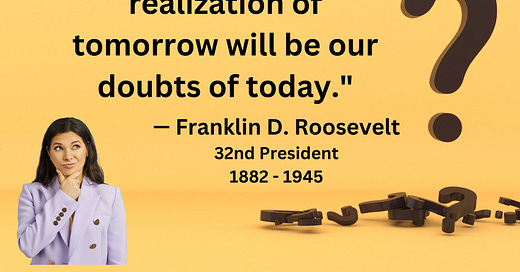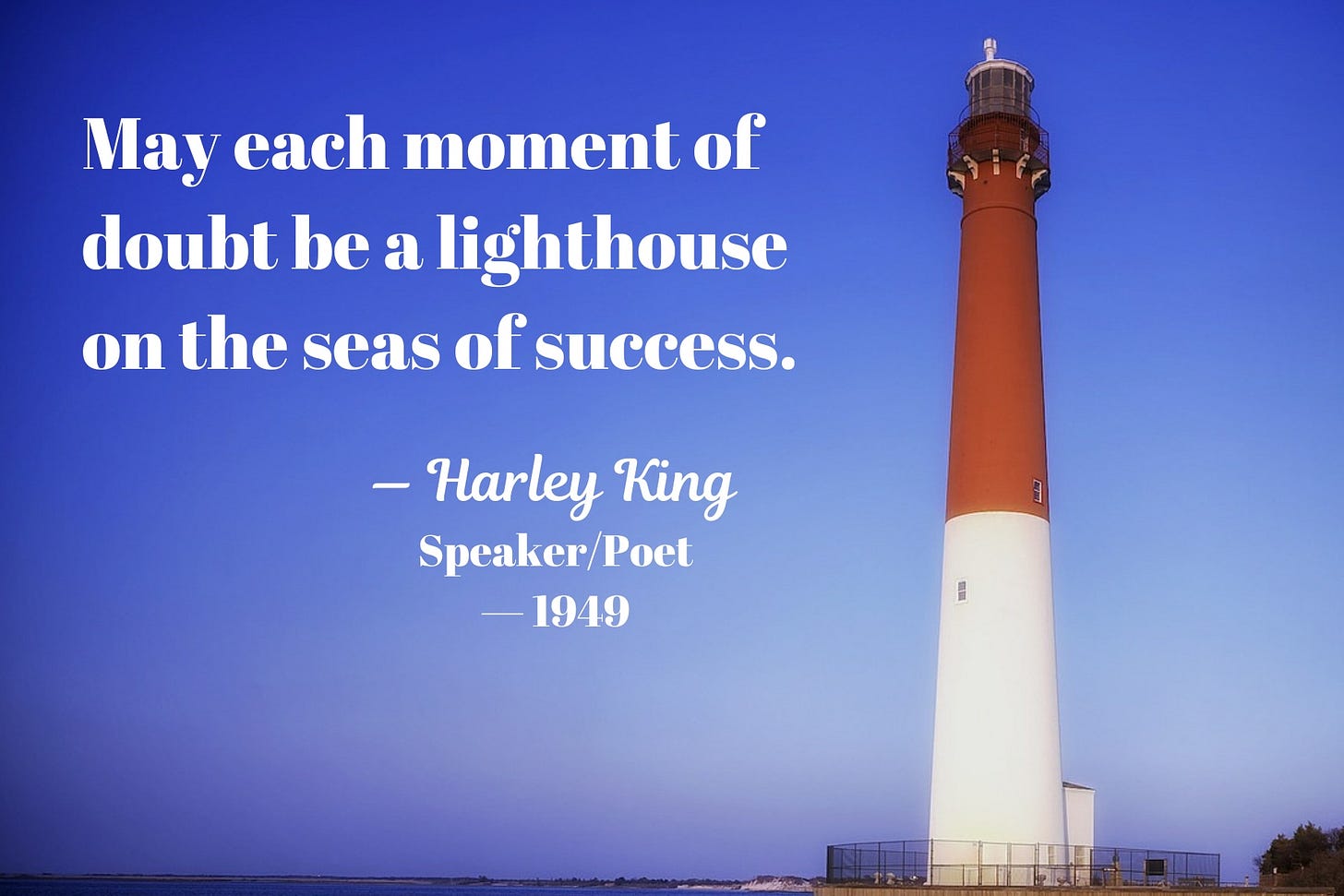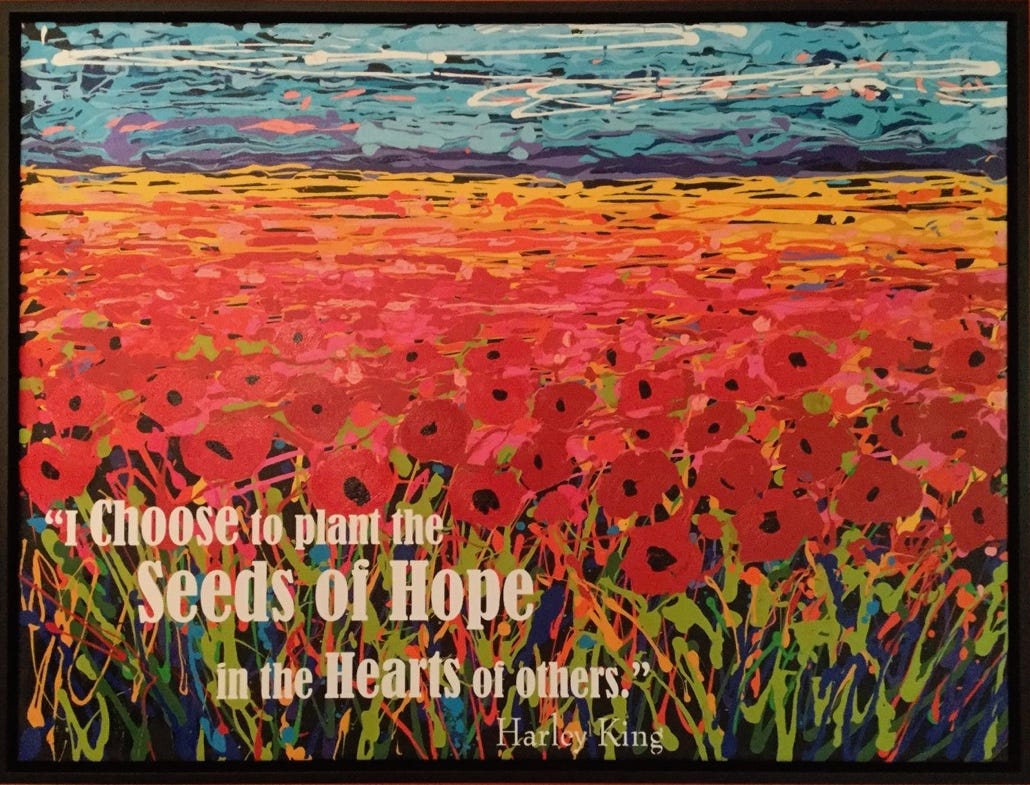Issue #60
Throughout my career, I have doubted my decisions. When I accepted my first writing job in health care, I was unsure. I knew nothing about long-term care. Fortunately, I had a good boss, and his encouragement allowed me to work through my doubts.
Five years later, I was offered a marketing position, and again, I experienced doubt despite having built a reputation for hard work and creative thinking within the company. I knew nothing about marketing and had no desire to be a salesperson. Again, with the encouragement of my new boss and a willingness to learn from others, I could move beyond the doubt to success.
We all have doubts, and those doubts sometimes hinder our success. Have your doubts ever stopped you from doing what you wanted to do? Over the years, I have dreamed of starting my own business. Yet, my fears and doubts have prevented me from moving ahead.
I have often second-guessed myself. When I buy something, I always question why I did what I did. When I trade in a car for a new one, I begin to doubt my decision. What doubts are preventing you from becoming the person you want to be?
New managers often have doubts about their talents and abilities. They are uncomfortable with the decisions they are called upon to make. They are uncertain about whether the employees like them or not.
Beginning writers and artists often have doubts about their talents and abilities. Even seasoned writers who have published multiple books may still have doubts when they begin a new book. "Do I still have what it takes? Can I pull it off again?"
Fear and doubt are normal responses to a new activity or situation. If we allow ourselves to wallow in self-doubt, we will never move beyond it. We must find a way to believe in ourselves and our abilities. What are you doing to push through the doubt to success?
Much of the self-help literature stresses the importance of confidence. When we make a decision, we should not look back, question, or doubt ourselves. We should act as if we have no fear.
Yet, self-doubt can be beneficial because it prevents us from becoming overconfident. When people are overconfident, they make mistakes, assume too much, and become reckless. Doubt allows us to step back and reassess the situation to ensure we are making the right decisions.
Have you ever made a decision and then had second thoughts? This is normal. We often second-guess ourselves. Most of the time, our initial decision was the best one, and we should move forward. But occasionally, this moment of reassessment allows us to change course and correct our mistakes.
My wife and I spent our honeymoon in Acapulco, Mexico. My parents paid for our trip since we had almost no money, and I had only a part-time job. One day, a young man offered us a free dinner if we attended a sales pitch about timeshares. We took him up on his offer. Now, I am a sucker for a good sales pitch, and I bought hook, line, and sinker. I signed the contract despite having insufficient income to make the monthly payment.
Even before the ink was dry on the contract, doubt set in. I knew I had made a mistake. I could not afford the deal, no matter how good it was. People can read me like a book, and I am sure the salesman could read the doubt and even fear on my face. He made the mistake of telling me that I could tear up the contract if I were not satisfied. I didn't hesitate. I tore up the contract and walked out of the room, not waiting for my wife.
My young bride was shocked and embarrassed by my behavior, and she has not let me forget it in 51 years of marriage. Of course, now we laugh about my cold feet and doubt. Yet, I know I made the right decision. Sometimes, doubt protects us from ourselves and our impulses.
Yes, self-confidence is essential to success, but self-doubt is a lighthouse that will keep you from running aground. Don't become shipwrecked on the rocks of time. Be willing to rethink your decisions and change course.
Franklin D. Roosevelt
Born January 20, 1882 in Hyde Park, New York to James Roosevelt and Sara Ann Delano. Both parents came from wealthy families.
Homeschooled by tutors until age 14. Attended Groton School, an Episcopal boarding school.
Attended Harvard College in 1903 with an A.B. in history.
Entered law school in 1904 but dropped out after passing the Bar Examination.
Franklin was the fifth cousin of Theodore Roosevelt who became President in 1901.
Franklin married Eleanor Roosevelt in 1905 against the wishes of his mother. Eleanor was a niece of Theodore and a fifth cousin once removed.
Franklin and Eleanor had six children.
Elected to the New York State Senate in 1910.
Served as Assistant Secretary of the Navy from 1913 to 1919.
Diagnosed with polio in 1921 and remained permanently paralyzed from the waist down.
Served as Governor of New York from 1929 to 1932.
Elected President in 1932. Inaugurated on March 4, 1933. Served as President from 1933 to 1945. Won 57% of the popular vote in 1932.
Created the Federal Deposit Insurance Corporation.
Created the Tennessee Valley Authority.
Passed the Social Security Act of 1935 through congress.
Established the Works Progress Administration (WPA).
Established the National Labor Relations Board.
On December 7, 1941 the Japanese attacked Pearl Harbor killing 2,403 Americans.
On December 11, 1941 Hitler and Mussolini declared war on the United States.
Authorized and funded the Manhattan Project to develop the first nuclear weapons.
Passed the G.I. Bill in June 1944 creating massive benefits for returning soldiers.
Elected to a 4th term in 1944.
Died of a massive intracerebral hemorrhage on April 12, 1945.
Source: Wikipedia
Plant seeds of hope in the hearts of others!
Thanks for reading.







Another winner that really speaks to me, Harley. I love, LOVE the quote from FDR, that is what my new book is all about. Actually it's about how to overcome those doubts and replace them on a permanent basis.
I love your story about the timeshare contract and wish that our salesperson had told us what yours told you. We are still paying maintenance fees for vacations that we can't take. I guess I was a bigger sucker than you.
I am, once again, having the feeling that we might have a space to talk about some joint projects since it seems that we are on the same track so much.
Peace and thanks again.
You make a good point, Harley, that we all have doubts and to achieve goals we must push through them and not let them limit us. At 62 I had doubts about returning to the corporate workforce. Thank God I overcame those doubts (financial necessity gave me a hard push). It made possible a debt-free retirement 5 years later. If doubt is a "lighthouse," it's behind me casting a light in the direction I should go. Lord I doubt. Help Thou my unbelief.